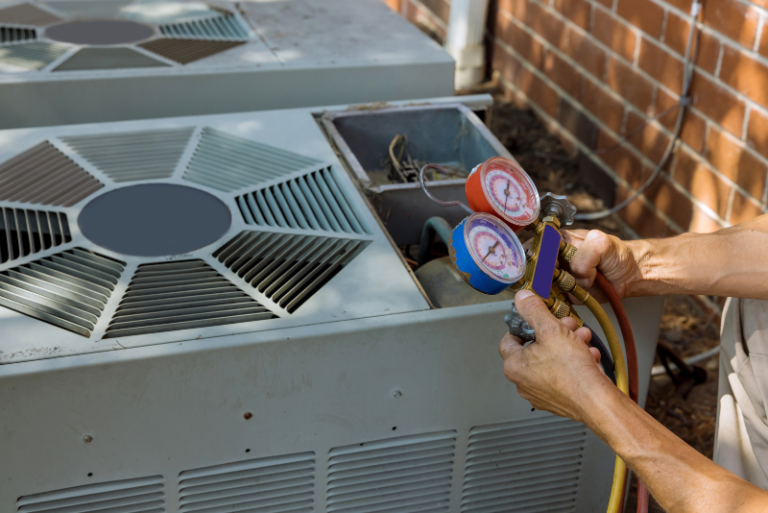When was the last time you thought about servicing your HVAC system? If you’re like many homeowners, it might be running without much attention, but neglecting regular maintenance can lead to inefficiency, higher energy bills, and costly repairs. So, how often should HVAC be serviced to keep it running smoothly and efficiently?
In this guide, we’ll break down why regular HVAC servicing is essential, how frequently it should be done, and the benefits of keeping your system well-maintained for optimal performance.
Why HVAC Maintenance Matters

Crucial Role in Home Comfort:
Your HVAC system keeps you comfortable year-round—cooling in summer and heating in winter.
Regular Attention is Necessary
Like any other major system in your home, your HVAC requires routine servicing to function optimally.
Ensures Efficiency
Regular maintenance helps your HVAC system run efficiently, reducing the chances of breakdowns and preventing costly repairs.
Improves Indoor Air Quality
Servicing ensures clean ducts and filters, which can improve air quality and create a healthier environment for your family.
Protects Your Investment
Regular servicing helps extend the lifespan of your HVAC system, saving you money on repairs or premature replacements.
Lowers Energy Bills
A well-maintained system runs more efficiently, helping to lower your monthly energy bills.
Reduces Stress During Peak Seasons
With regular servicing, you’re less likely to experience unexpected issues during the busiest times of year (e.g., summer or winter).
How Often Should HVAC Be Serviced for Optimal Performance?
Heating Systems
Schedule a check-up in the fall to ensure it’s ready for the winter chill.
Cooling Systems
A pre-summer service in the spring ensures your air conditioner is in top shape for warmer temperatures.
Service Frequency Based on Your Climate
If you live in an area with extreme temperatures or use your HVAC system year-round, you may need more frequent servicing to ensure peak performance. Here’s how climate impacts maintenance:
- Colder Climates: Heating systems work harder in colder temperatures, so more frequent checks can prevent breakdowns during cold snaps.
- Hot Climates: Air conditioning systems often run year-round, requiring more attention to maintain energy efficiency.
- Milder Climates: Annual servicing is typically sufficient as HVAC systems don’t run as often.
By customizing your service schedule to your local climate, you can extend the life of your system and prevent costly repairs.
DIY HVAC Maintenance Tips
While professional servicing is crucial, you can perform a few simple tasks to keep your HVAC system in top shape between services. These DIY steps help improve efficiency and extend the system’s life:
- Change the air filter: Replace it every 1-3 months for better airflow and improved air quality.
- Clean the condenser coils: Remove dirt and debris to maintain efficiency and prevent overheating.
- Check for air leaks: Seal gaps around windows and doors to reduce energy waste.
- Clear the condensate drain: Keep it free of blockages to prevent water damage and ensure efficient cooling.
By following these steps, you can reduce the likelihood of emergency repairs and help your HVAC run smoothly year-round.
HVAC Servicing Costs and Benefits
Routine HVAC servicing typically costs between $100 and $300, which is a small price to pay considering the long-term savings. Regular maintenance helps:
- Prevent costly repairs: Catch minor issues early, such as refrigerant leaks or worn parts, before they turn into expensive problems.
- Lower energy bills: A well-maintained system runs more efficiently, potentially reducing energy use by up to 30%.
- Extend your system’s life: Proper care can help avoid costly replacements, which can range from $3,000 to $7,000.
Investing in regular servicing helps protect your HVAC system and your wallet in the long run.
Signs Your HVAC Needs Immediate Attention
If you notice any of these issues, it’s time to call a professional:
Unusual noises
Grinding, banging, or squealing sounds may indicate mechanical problems.
Inconsistent temperatures or weak airflow
Uneven temperatures or weak airflow could signal duct or filter issues.
Strange odors
Musty or burning smells can point to mold or electrical problems.
Higher energy bills
A sudden spike in energy costs might mean your system is less efficient.
Frequent cycling
If your HVAC system turns on and off too often, there could be an underlying issue.
Seasonal vs. Year-Round HVAC Care
While most homeowners schedule HVAC maintenance annually, those in areas with fluctuating temperatures or year-round use may need more frequent care.
Benefits of Seasonal Care:
- Prepares for Seasonal Changes: Servicing before the heating or cooling season ensures your system is ready for high demand, helping to prevent breakdowns during extreme weather.
- Maintains Efficiency: Regular seasonal checks keep your HVAC system running efficiently, avoiding unnecessary strain during peak usage.
Benefits of Year-Round Care:
- Increased Reliability: Regular checks throughout the year keep your system in optimal condition, reducing the chances of issues during temperature extremes.
- Better Performance: Ongoing maintenance addresses wear and tear, ensuring your HVAC performs well throughout the year.
- Improved Efficiency: Consistent servicing helps maintain efficiency, lowering energy bills and extending your system’s lifespan.
Conclusion
Regular HVAC servicing is crucial for maximizing efficiency, prolonging system life, and reducing energy costs. By scheduling timely maintenance and performing simple DIY tasks, you can avoid costly repairs, ensure comfort, and protect your investment.
Whether annual or year-round, staying proactive with HVAC care will keep your home comfortable all year long. If you need professional assistance, don’t hesitate to contact an expert.



